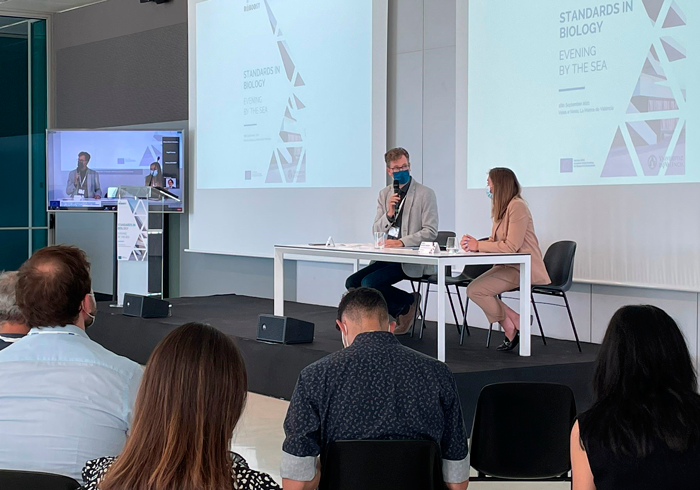Users
Social media
- More details here...
- Address
Parc Científic de la Universitat de València C/
Catedrático Agustín Escardino, 9
46980 Paterna (Valencia) Spain - Email:
iu.i2sysbio@uv.es - Phone:
(+34) 963544810
- Address
Links
The white paper on standardization in Synthetic Biology is presented in Valencia

Investigation
The white paper on standardization in Synthetic Biology is presented in Valencia

The final meeting of the European project "BIOROBOOST: fostering synthetic biology standardization through international collaboration", coordinated by the University of Valencia, took place on September 15 and 16, 2021. The objective of this H2020 project has been to promote discussion on standards in synthetic biology through international collaboration. Within the framework of a series of debates with representatives of the biotechnology industry, the White Paper “Standardization in Synthetic Biology: State-of-the-art and recommendations for policy makers” was presented.
On Thursday, September 16, 2021, in the Veles e Vents building, a series of events took place in which members of the biotechnology industry participated, not only national, but also international, in the presence of representatives of the University of València, the Valencia City Council, the Generalitat Valenciana and the European Commission. This event marked the completion of the BioRoboost project, which has been funded through the European Union's Horizon 2020 research and innovation program with €2M.
Standards are everywhere in our civilization. Examples of standards are nuts and bolts, the parts our cars are made of, or the operating systems that make our computers and mobile phones possible. Standards work because they are robust, reliable, universal and, of course, they do it in the expected way, so they have predictable behavior. But this is engineering. What's happening in biotechnology? Biotechnology is an engineering of biological functions beyond those evolved in nature. The most advanced version of biotechnology is synthetic biology, which aims to make the design and construction of living organisms possible. If we want this ambitious goal to become a reality, synthetic biology also needs standards. To fill this gap and encourage standardization in biology as much as possible, the European Union's H2020 BioRoboost program project was born.
Over the past three years, a unique combination of 25 entities (21 European and 6 non-European entities) such as research laboratories, social scientists, companies and biotechnology-related experts from Europe, Asia and the United States, have carried out extensive research work. This research has culminated in the celebration of several events, among others, the publication and presentation of the white paper "Standardisation in Synthetic Biology: State-of-the-art and recommendations for policy makers", in which different topics about standards in Synthetic Biology are presented and discussed. The book contains a series of specific recommendations for those with decision-making power, not only in science but also in politics, to move towards the standardization of synthetic biology. The book promotes simple actions that allow progress towards the definition of standards, as well as general lines to achieve this ambitious objective.
The white paper was presented by Manuel Porcar, Principal Investigator of the BioRoboost Project and leader of the Biotechnology and Synthetic Biology Group of the Institute of Integrative Systems Biology (I2SysBio, joint UV-CSIC center), together with Víctor de Lorenzo (CNB-CSIC), Elena Ordozgoiti (UNE) and Ángel Sources (European Commission).
Next, several international representatives of the biotechnology industry participated in a round table in which relevant aspects of the adoption of standards were discussed. Finally, local and national biotechnology companies took center stage, among which was Darwin Bioprospecting Excellence, a spin-off of the University of Valencia based in its Science Park, to talk about the impact that R&D&I activities have on the future of this industry and as well as the role of the conclusions reached with BioRoboost. Attendees also received an offprint of the monograph from the Mètode magazine of the University of Valencia dedicated to standards and published within the framework of BioRoboost.
Synthetic biology has advanced a lot in the last decade. We are actively participating in one of the scientific and technological revolutions that will decide the course of future knowledge and BioRoboost includes the University of Valencia on the map of this field of research.
Images:





